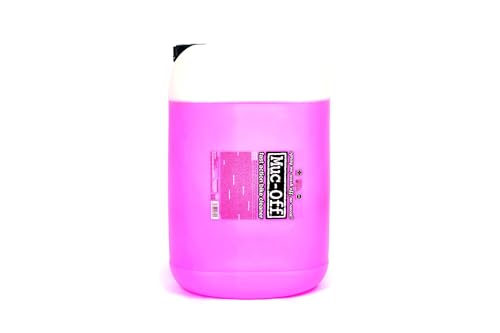




Have you ever pulled a load of laundry out of the washing machine, only to find unsightly orange stains on your clothes? It can be frustrating and perplexing to discover the cause of these stains, especially when you’ve followed all the proper washing instructions. In this article, we will delve into the origins of these orange stains and explore potential solutions to eliminate them.
One possible cause of orange stains on clothes after washing is the presence of rust. If your washing machine has rust or if you have rusty pipes, it’s possible for small rust particles to dislodge and stain your clothes during the wash cycle. These particles can mix with the water and detergent, creating a rusty orange color that adheres to the fabric. Additionally, if you live in an area with high iron content in the water, it can also contribute to the occurrence of orange stains.
Another culprit behind orange stains on clothes could be the use of certain cleaning products. Some laundry detergents contain ingredients that can react with minerals and metals in the water, resulting in the formation of unwanted stains. It’s important to read the labels of your detergent and avoid using products that may cause this chemical reaction. Alternatively, you can switch to a detergent specifically formulated to prevent stains and maintain the color vibrancy of your clothes.
To effectively remove orange stains from your clothes, you may need to take proactive measures. Pre-treating the stained areas with a stain remover or a mixture of baking soda and water can help to break down the stains before washing. Additionally, using a higher water temperature during the wash cycle and adding a cup of vinegar to the rinse cycle can aid in removing stubborn stains. Consistently following these steps, along with regularly cleaning your washing machine, can help prevent the recurrence of orange stains on your clothes.
In conclusion, orange stains on clothes after washing can be caused by rust particles, high iron content in the water, or reactive cleaning ingredients. By taking preventative measures and using appropriate stain-removing techniques, you can eliminate these unsightly stains and keep your clothes looking fresh and vibrant.
What Causes Orange Stains on Clothes After Washing?
If you’ve ever noticed orange stains on your clothes after washing them, you’re not alone. This frustrating problem can occur for a variety of reasons. Understanding the causes of these stains can help you prevent them in the future.
Hard Water
One common cause of orange stains is hard water. Hard water contains high levels of minerals, such as iron and manganese, which can react with detergents and result in discoloration. When you wash your clothes in hard water, these minerals can bind to the fabric, causing the orange stains.
Iron Oxide
Another cause of orange stains is iron oxide, also known as rust. If your washing machine has rusty parts or if you have iron-rich water, the iron oxide can transfer to your clothes during the wash cycle. This can result in orange stains that can be difficult to remove.
Improper Detergent Use
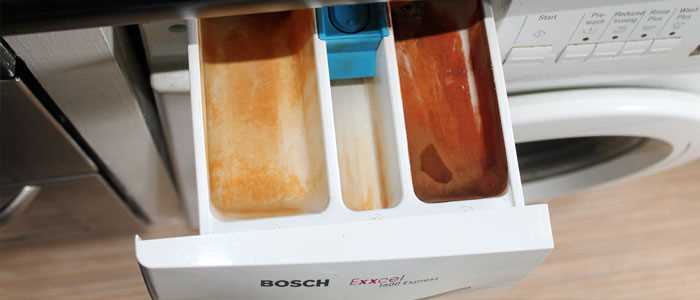
Using too much or too little detergent can also lead to orange stains. If you use too little detergent, dirt and oils may not be fully removed from the clothes, resulting in discoloration. On the other hand, using too much detergent can leave behind residue that can react with minerals in the water and cause stains.
Overloading the Washing Machine
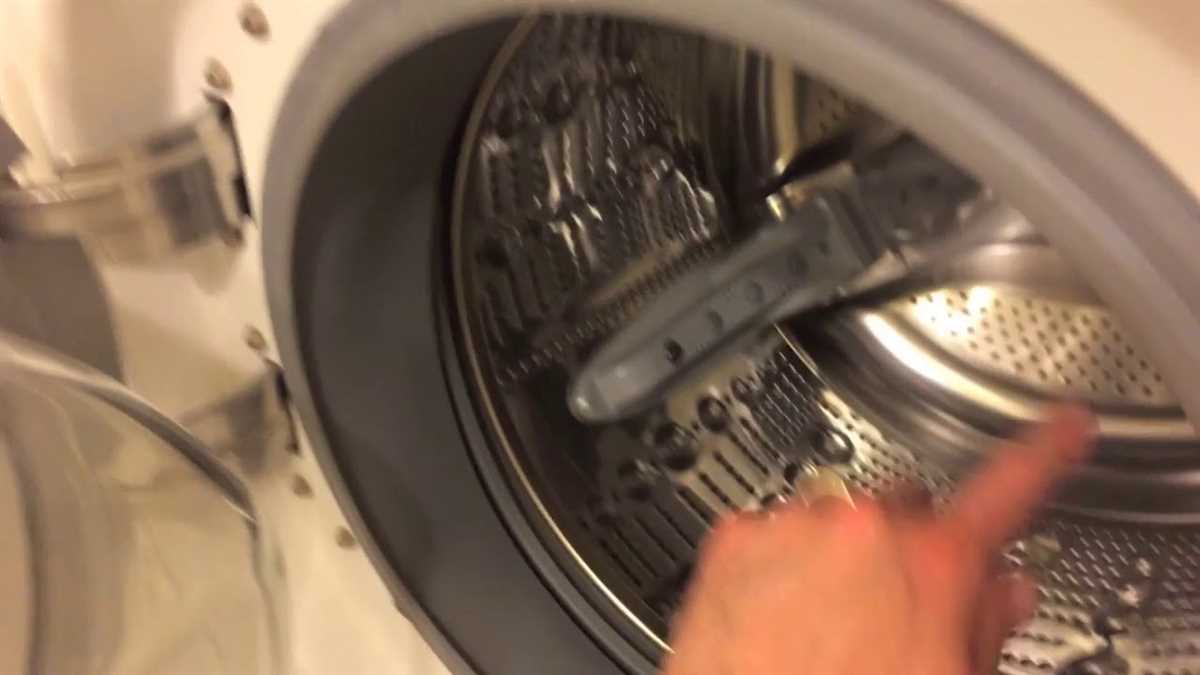
Overloading your washing machine can prevent clothes from getting fully clean. This can lead to orange stains if dirt and oils are not fully removed. It can also cause residue from detergent or fabric softener to build up on the clothes, resulting in discoloration.
Solutions to Prevent Orange Stains
To prevent orange stains on your clothes after washing, there are a few steps you can take:
- Use a water softener to reduce mineral content in the water if you have hard water.
- Regularly clean your washing machine to remove any rust or buildup that could transfer to your clothes.
- Use the correct amount of detergent for your load size and water hardness.
- Avoid overloading your washing machine to ensure clothes are properly cleaned.
By understanding the causes of orange stains on clothes after washing and taking preventive measures, you can keep your clothes looking fresh and stain-free.
The Origins of Orange Stains on Clothes
Orange stains on clothes can be a frustrating and unsightly problem. They can ruin the appearance of your favorite garments and make you question the effectiveness of your laundry routine. To understand how to prevent and remove these stains, it’s important to first understand their origins.
Rust and Metal Oxidation
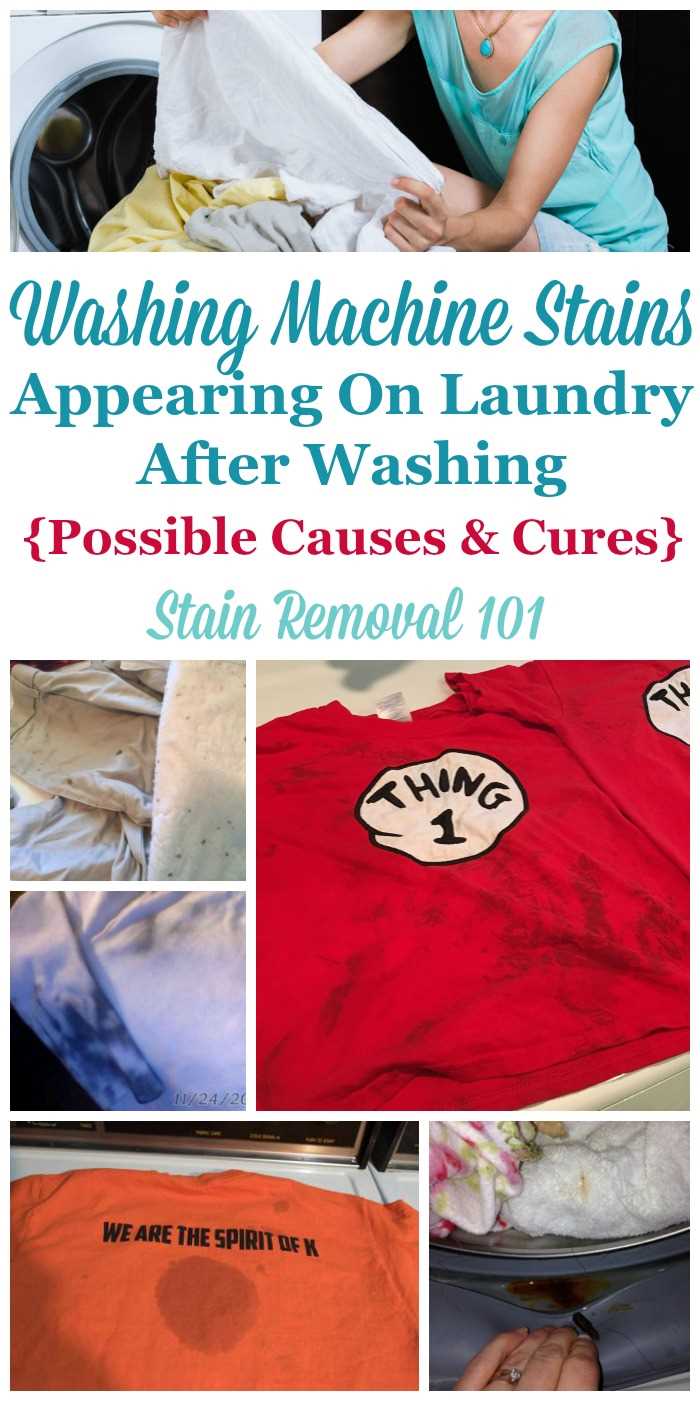
One of the most common causes of orange stains on clothes is rust or metal oxidation. When metal objects or components, such as zippers, buttons, or snaps, come into contact with moisture, they can oxidize and form rust. This rust can transfer onto your clothes during the washing or drying process, leaving behind orange stains.
Mineral Deposits in Water
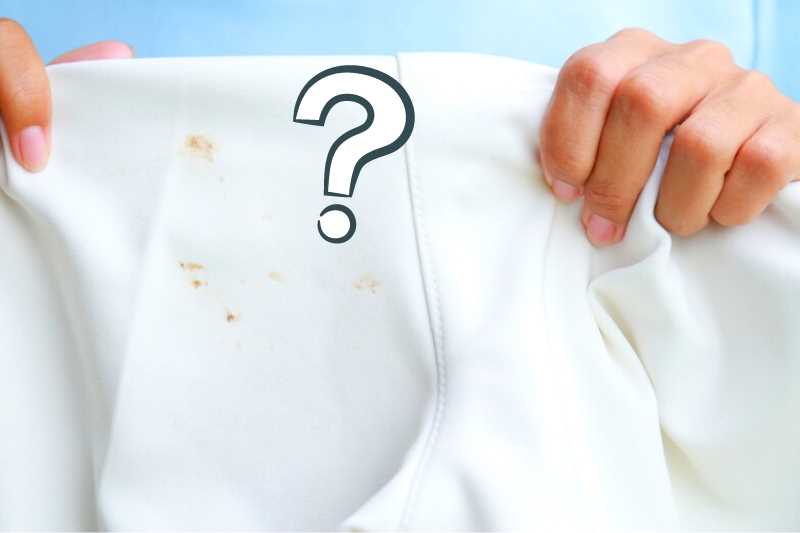
Another potential culprit for orange stains is mineral deposits in water. If your tap water contains high levels of iron or manganese, it can leave behind stains on your clothes. These minerals can react with the detergent or fabric softener, causing the stains to appear during the washing or drying process.
Dye Transfer
Dye transfer is another common cause of orange stains on clothes. If you mix different colored garments in the wash without taking precautions, the dyes from one item can bleed onto another, leaving behind orange stains. This can happen especially with clothing items that have not been properly prewashed or color-treated.
Stain-Prone Fabrics
Some fabrics are more prone to developing orange stains than others. For example, fabrics that are light-colored or made from synthetic materials are more likely to show these stains. This is because synthetic materials can react differently with certain substances, causing discoloration.
Conclusion
Understanding the origins of orange stains on clothes is the first step in preventing and removing them. By addressing the root causes, such as rust, mineral deposits, dye transfer, and stain-prone fabrics, you can take proactive measures to keep your clothes stain-free and maintain their quality and appearance.
Understanding the Chemical Reactions
Orange stains on clothes after washing can be caused by a variety of chemical reactions. Understanding these reactions can help us identify the source of the stains and find appropriate solutions.
1. Oxidation of Iron
One of the common causes of orange stains is the oxidation of iron. Sometimes, clothes contain tiny metallic particles, such as iron residues from water or rust from washing machines. When these particles come into contact with oxygen, they undergo oxidation, leading to the formation of orange-colored compounds. This is particularly common in areas with hard water, which contains higher levels of iron.
2. Interaction with Detergent Ingredients
Detergents often contain various ingredients, such as enzymes, surfactants, and bleaching agents. These ingredients can react with certain substances present in clothes, like dirt, sweat, or oils. When these reactions occur, they can produce colored compounds that result in orange stains. The temperature and pH of the water can also influence these reactions.
3. Chemical Reaction with Stain Removers
Sometimes, the use of stain removers or brightening agents can contribute to the formation of orange stains. These products often contain chemicals that can react with the dyes or residues present on clothes, leading to color changes. Furthermore, if not properly rinsed, the residues of stain removers can continue to react with the fabric, resulting in orange discoloration.
4. Interaction with Fabric Softeners or Fragrances
Fabric softeners and fragrances can contain ingredients that are prone to chemical reactions with certain dyes or residues on clothes. These reactions can generate orange stains, especially if the fabric softener is not entirely dissolved in the water or if it comes into direct contact with the fabric without proper dilution.
5. Combination of Factors
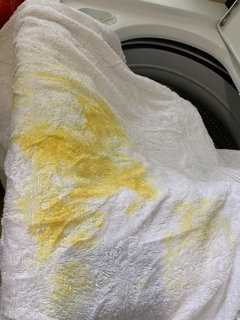
In some cases, orange stains can result from a combination of various factors, such as the presence of iron residues, reaction with detergent ingredients, and the use of stain removers or fabric softeners. The specific combinations of these factors can vary depending on individual circumstances, water quality, detergent used, and the type of fabric.
Understanding the chemical reactions that can cause orange stains on clothes after washing is crucial in order to identify the source of the problem and effectively address it. By addressing the root causes, it is possible to prevent the recurrence of these stains and maintain the quality and appearance of the clothes.
Common Culprits: Dye Transfer and Iron Contamination
In the quest to solve the mystery of orange stains on clothes after washing, two common culprits stand out: dye transfer and iron contamination. Understanding the causes and effects of these factors can help in finding effective solutions to tackle this frustrating laundry problem.
Dye Transfer
Dye transfer occurs when colored dyes from one fabric transfer onto another fabric. This can happen during the washing process, causing visible stains on clothes. There are several reasons why dye transfer may occur:
- Mixing Different Colored Clothes: Washing clothes of different colors together can lead to dye transfer. The colored dyes can bleed or migrate onto other fabrics, resulting in unwanted staining.
- Washing New Clothes: New clothes, especially brightly colored ones, may have excess dye that has not been properly set. When these clothes are washed, the excess dye can transfer onto other garments.
- Overloading the Washing Machine: Overloading the washing machine with too many clothes can prevent proper water circulation. This can result in inadequate rinsing and increased chances of dye transfer.
Iron Contamination
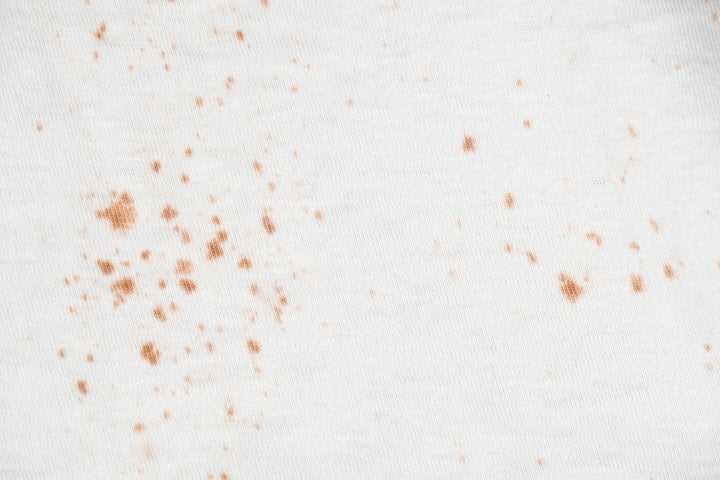
Iron contamination refers to the presence of iron particles in the water or washing machine that can cause orange stains on clothes. Iron contamination can occur due to several reasons:
- Hard Water: Hard water contains high levels of minerals, including iron. When clothes are washed in hard water, the iron particles can attach to the fabric and cause stains.
- Washing Machine Rust: Over time, the interior of the washing machine can accumulate rust. When the machine is used, the rust particles can mix with the water and lead to iron contamination.
- Iron Piping: If the water supply pipes are made of iron or contain iron particles, the water used for washing can carry iron contaminants. This can result in orange stains on clothes.
Understanding these common culprits behind orange stains on clothes can help in identifying potential solutions. Solutions include separating laundry by color, washing new clothes separately, avoiding overloading the washing machine, using water softeners for hard water, regularly cleaning the washing machine, and checking the water supply for iron contamination.
Preventing and Removing Orange Stains
Orange stains can be frustrating and unsightly, but there are several steps you can take to prevent and remove them from your clothes. Here are some helpful tips:
Prevention

- Separate your laundry: Avoid washing clothes with items that may bleed or transfer color, such as towels or new garments. Sorting your laundry can help prevent the migration of dyes onto your clothes.
- Pre-treat stains: If you notice any stains on your clothes before washing, it’s important to pre-treat them. Use a stain remover or a mixture of detergent and water to gently work on the stain before laundering the garment.
- Check the water quality: Orange stains can sometimes be caused by minerals or rust in the water. If you suspect that this is the case, consider installing a water filtration system or using distilled water for your laundry.
- Avoid using chlorine bleach: Chlorine bleach can react with certain minerals or compounds in water and lead to the formation of orange stains. Opt for oxygen-based or color-safe bleach instead.
Removal
- Act quickly: If you notice an orange stain on your clothes after washing, it’s important to act quickly. The longer the stain sits, the more difficult it may be to remove.
- Use a stain remover: Apply a stain remover directly to the affected area and let it sit for a few minutes. Then, gently scrub the stain with a soft brush or a cloth.
- Try lemon juice or vinegar: Natural acids like lemon juice or vinegar can help break down the stain. Apply a small amount to the stained area, let it sit for a few minutes, and then wash the garment as usual.
- Consider color-safe bleach: If the stain persists, you can try using a color-safe bleach specifically designed for colored fabrics. Follow the instructions on the product packaging for best results.
- Consult a professional: If all else fails, and the stain is still stubbornly present, it may be best to consult a professional cleaner who has experience with removing tough stains.
By following these prevention and removal tips, you can help minimize and eliminate orange stains on your clothes, keeping them looking fresh and stain-free for longer.
Expert Tips and Recommendations
1. Separate clothing items by color
One of the best ways to prevent orange stains on your clothes after washing is to separate your clothing items by color. Washing darker and brighter colors separately from lighter colors can help prevent color bleeding and transfer, which can contribute to orange stains.
2. Use the right detergent

Choosing the right detergent can make a big difference in preventing orange stains. Look for detergents that are specifically formulated to prevent color bleeding and fading. These detergents usually have color-safe or color-protecting properties that can help maintain the vibrant colors of your clothing.
3. Check the water temperature
It’s important to pay attention to the water temperature when washing your clothes. Using water that is too hot can cause color bleeding and transfer, which can result in orange stains. Opt for cooler water temperatures when washing colorful clothing items to minimize the risk of color bleeding.
4. Avoid overloading the washing machine
Overloading the washing machine can prevent clothes from getting thoroughly cleaned, leading to color bleeding and transfer. Make sure to follow the recommended load capacity of your washing machine to ensure that there is enough room for the water and detergent to circulate around the clothes while washing.
5. Treat stains promptly
If you do notice any orange stains on your clothes after washing, it’s important to address them promptly. Treat the stains as soon as possible using stain removers or gentle detergents to prevent them from becoming permanent.
6. Use color catchers or vinegar
To further prevent color bleeding and transfer, you can consider using color catchers or adding vinegar to the wash. Color catchers are disposable sheets that can absorb and trap dyes released during the washing process, preventing them from transferring onto other clothes. Adding a cup of vinegar to the wash can also help set the colors and prevent bleeding.
7. Air dry your clothes

Using a clothes dryer can sometimes contribute to color bleeding and fading. To minimize the risk of orange stains, consider air drying your clothes instead. Hang them up using clothespins or lay them flat on a clean surface to dry naturally.
8. Follow garment care instructions
Always take the time to read and follow the care instructions on your clothing items. Different fabrics and dyes may require specific washing techniques or temperature settings. By following these instructions, you can help maintain the integrity of the colors and reduce the risk of orange stains.
9. Test new garments before washing
Before washing a new or unknown garment, it’s a good idea to test it for color bleeding. Dampen a small, inconspicuous area of the fabric and press it against a white towel. If you notice any color transfer, wash the garment separately or with similar colors to prevent staining other clothes.
10. Consult a professional
If you have tried various preventative measures and still experience orange stains on your clothes after washing, it may be beneficial to consult a professional cleaner. They can provide expert advice and recommend specialized treatments that may effectively remove the stains and restore the vibrancy of your clothing.
FAQ
Why do my clothes have orange stains after washing?
Orange stains on clothes after washing can be caused by a variety of factors. One common cause is using too much detergent or using a detergent that contains high levels of iron. Another possible cause is using hard water, which can contain minerals that react with the detergent and cause staining. Additionally, certain foods and beverages, such as orange juice or foods containing turmeric, can leave behind orange stains if not properly rinsed before washing. It is important to identify the specific cause in order to find the appropriate solution.
How can I prevent orange stains on my clothes?
To prevent orange stains on clothes, there are several steps you can take. Firstly, make sure to use the correct amount of detergent according to the package instructions, and avoid using a detergent that contains high levels of iron. If you have hard water, consider using a water softener or adding a water conditioner to your laundry. To prevent food or beverage stains, be sure to thoroughly rinse any items before washing them, especially if they contain substances that are prone to staining. Regularly cleaning your washing machine can also help prevent staining by removing any built-up residue or minerals.
Are there any home remedies to remove orange stains from clothes?
Yes, there are a few home remedies that may help remove orange stains from clothes. One option is to create a paste using equal parts baking soda and water, then apply it to the stain and let it sit for 30 minutes before rinsing and laundering as usual. Another option is to soak the stained garment in a mixture of white vinegar and water for a few hours before laundering. It is important to note that the effectiveness of these remedies may vary depending on the specific stain and fabric, so it is always a good idea to test them on a small, inconspicuous area of the garment first.
Can orange stains be removed from all types of fabrics?
Orange stains can typically be removed from most types of fabrics, but it is important to consider the specific fabric and stain before attempting any stain removal techniques. Some fabrics may be more delicate or prone to colour bleeding, so it is best to follow the manufacturer’s instructions or consult with a professional cleaner if you are unsure. It is also important to act quickly when treating stains, as older or set-in stains may be more difficult to remove. If in doubt, it is always a good idea to test any stain removal method on a small, inconspicuous area of the garment first.
Why do I only see orange stains on some of my clothes?
Seeing orange stains on only some of your clothes can indicate that the cause of the staining is not universal. It is possible that certain fabrics or colours are more susceptible to staining, or that only specific items have come into contact with substances that cause the orange stains. It is also possible that there is a specific issue with your washing machine, such as a build-up of residue or mineral deposits that are only affecting certain loads of laundry. It may be helpful to keep track of when and how the staining occurs to try and identify any patterns or common factors.
What causes orange stains on clothes after washing?
Orange stains on clothes after washing can be caused by a variety of factors. One possible cause is the presence of iron in the water supply. Iron can oxidize and leave behind rust stains on fabric. Another possible cause is the use of certain laundry detergents or fabric softeners that contain dyes or fragrances that can transfer onto clothes during the washing process. Additionally, if clothes are not rinsed thoroughly after washing, detergent residue can build up and cause stains.
How can I prevent orange stains on my clothes after washing?
There are several steps you can take to help prevent orange stains on your clothes after washing. Firstly, you can install a water filter or water softener to remove iron and other contaminants from your water supply. Additionally, you can try using a laundry detergent and fabric softener that are specifically designed for sensitive skin and do not contain any dyes or fragrances. Make sure to also rinse your clothes thoroughly after washing to remove any detergent residue. If you still experience orange stains, you may need to consult a professional cleaner for specialized treatment.









